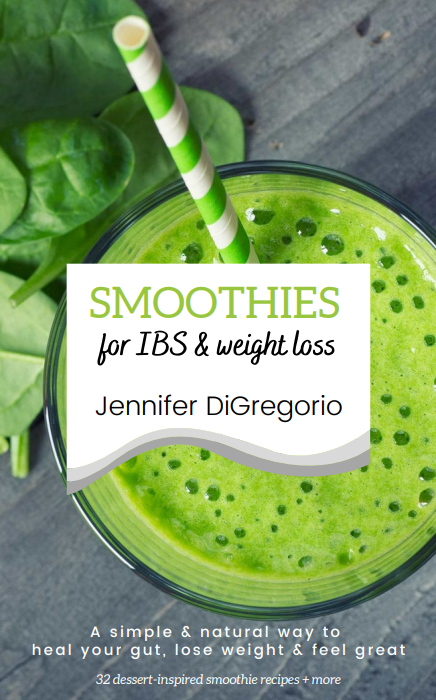Are you experiencing smoothie gas or other gut issues like bloating, pain, diarrhea or heartburn after consuming your smoothie?
These symptoms can be a problem for some people. To be honest, there was a time in my smoothie journey where smoothies were causing baby to have a little too much gas for her liking.
It took a bit of time for me to realize that some ingredients in my smoothies were causing me to run into isolated rooms throughout the day.
After some experimenting, I learned that too much kale or broccoli were triggers for my gas problems. So, I now use mainly spinach as my green base and only add small amounts of kale and broccoli.
I also learned a while back that I had a slight intolerance to avocados (an intolerance that developed during a stressful time in my life) and if I ate them in excess I would get heartburn. So, instead of using avocados as a healthy fat source in my smoothies, I opt for other healthy fats that my body responds well to.
Now, this doesn’t mean that kale, broccoli and avocados are unhealthy foods – it just means that they don’t work well for my body at this time in my life. How I react to these foods months or years down the road might be very different (or may be the same).
Our bodies are constantly changing – what works for you today might not work for you tomorrow. It’s important to be in-tune with your body and experiment with foods in your diet, so you can consume more of the foods that serve you well and avoid the ones that don’t.
If you’re experiencing smoothie gas or gut issues after consuming your smoothie, I strongly recommend that you don’t give up on this healthy habit, but instead make some tweaks so your body is better able to digest, process and absorb this nutrient-rich drink.
I’ve put together some practical tips you can experiment with if you’re experiencing any gut distress with your daily smoothie.

How to tweak your smoothie if you’re experiencing smoothie gas or gut issues
1. Reduce the amount of greens you put in your smoothie.
Some guts do a better job of digesting greens than others. If your gut is struggling, try reducing veggies to 1/2 a cup. You can increase this amount over time and see how your gut responds (I don’t recommend going over 1.5 cups of greens).
2. Avoid or reduce high sulfur vegetables like kale, broccoli and spinach.
Although high sulfur veggies are extremely good for your health they can sometimes cause and/or aggravate symptoms like gas and bloating. If you’re experiencing these symptoms, try using vegetables like lettuce, celery, watercress, mustard greens or zucchini instead. I also recommend avoiding any other ingredients you suspect are causing symptoms.
3. Re-evaluate the protein powder you’re using.
Protein powders are a big culprit when it comes to gut issues. Low-quality and high-allergen protein sources (and a long list of ‘other’ ingredients) can cause digestive problems and/or other health issues. If you’re uncertain whether your protein powder is causing symptoms, I suggest trying it on its own (with water only) and see how your body responds. Also, check out my protein powder checklist to help guide you with finding a high-quality protein powder.
4. Drink your smoothie slowly and in a calm state.
I know it may be tempting to pound back your delicious tasting smoothie, but this approach can be overwhelming for your gut. Drinking a smoothie should be no different than eating a meal – it’s important do to both slowly and in a stress free state. The slower you consume your food, the easier it is for your gut to process, digest and absorb nutrients. This is particularly important for those dealing with IBS.
In addition to experimenting with the above, I also recommend that you support digestion with these simple and practical tips.

















0 Comments